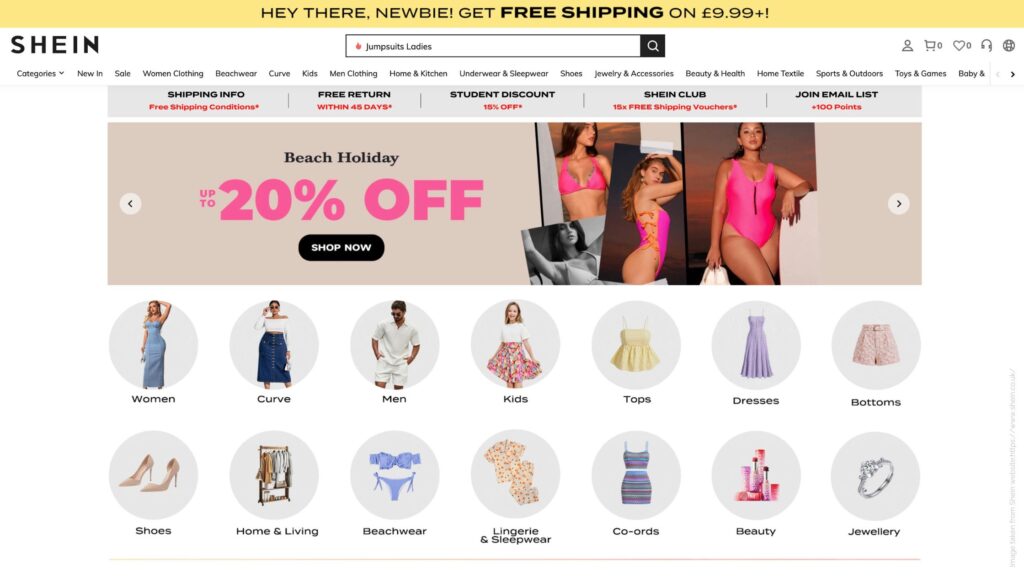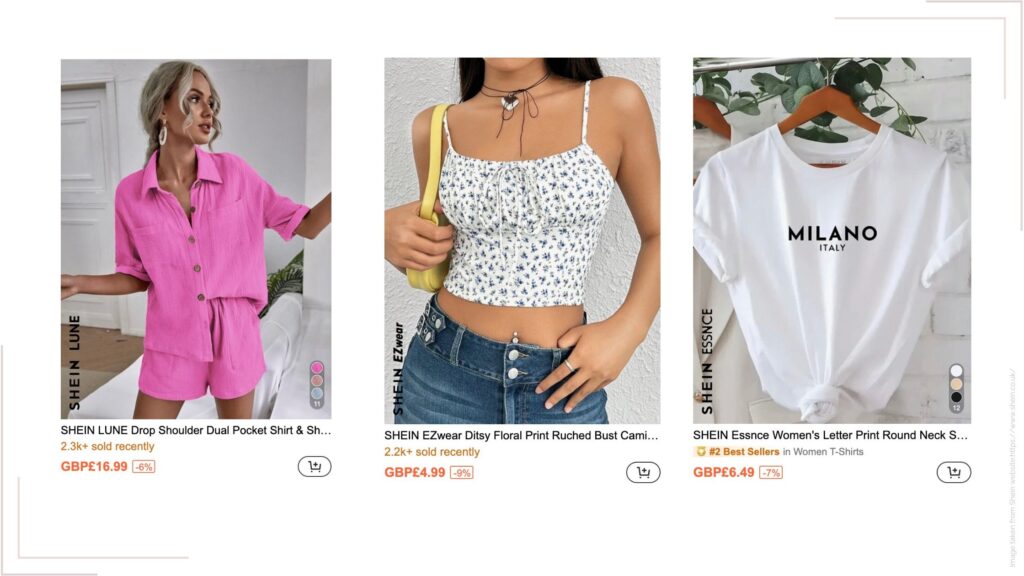The unstoppable growth of Shein, coupled with overproduction, pollution, and exploitation, as well as the prospect of an IPO in London, is deeply concerning.
Their track record of environmental harm and worker exploitation stands in stark contrast to the ethical standards we should uphold in the fashion industry and here in the UK.
I cannot be alone when I say we must demand better and push for true sustainability and ethics in fashion! However, I fear that, given the slump in the London Stock Exchange in 2023, the next elected government will view Shein’s IPO as a positive for the UK. Last year, Shein doubled its profits, making $2 billion in 2023 – but at what cost?
Who is Shein?

Shein, a Chinese fast-fashion retailer, has become a global powerhouse in a remarkably short period—a company that seemed to emerge from nowhere. It has become a dominant player in the lower end of the fashion market; chances are you’ve heard of it or seen its ads, even if you haven’t shopped there
Pronounced ‘She-In,’ it’s a brand that has gained momentum since the lockdown. While it appears to be a fashion company on the surface, its data collection and gamification strategies entice shoppers—categorise it as a fashion-tech company. Interestingly, the Shein app has come under scrutiny, being described as ‘addictive’ and in breach of the Digital Services Act (DSA).
Known for its ultra-affordable, trendy clothing, Shein primarily caters to Gen Z consumers through its extensive social media presence. Shein’s products (mainly fashion) are shipped to more than 150 countries and regions worldwide. On their About page, they state: “SHEIN is a global fashion and lifestyle e-retailer committed to making the beauty of fashion accessible to all.”
Why Sustainability Folk Are Opposed to the Business Model

Shein’s business model thrives on rapid production and vast output, raising many ethical and environmental concerns. It is estimated that they release 2,000 new pieces daily—not the number sold, but new items introduced
The company’s rapid turnover encourages a culture of disposable fashion. This practice contributes to significant textile waste and unsustainable consumer habits, diverging from the principles of the slow fashion movement and hindering progress toward the UN Sustainable Development Goals..
Shein’s Unsustainable and Unethical Practices
Studies have shown that Shein’s operations heavily contribute to the fashion industry’s overproduction problem. Reports indicate that the company prioritises speed over sustainability, resulting in massive amounts of clothing that often end up in landfills. Additionally, Shein’s reliance on synthetic fabrics like polyester exacerbates the environmental clothing waste issue we face (globally, as these materials are not biodegradable.
I spoke to Lora Jones, a business reporter, for BBC News back in 2021 about the problem with cheap polyester clothing, how their marketing tactics promote excessive consumption, and how social media outfit sharing has led to a condition called ‘ORS’, which stands for ‘Outfit Repetition Syndrome,’ a fear of being seen in the same outfit more than once.

“Shein has been very good at creating wants and must-have items,” GlobalData retail analyst Neil Saunders told CBS MoneyWatch. Its online strategy is aggressive and manipulative and preys on teens who consume content daily on social media channels like TikTok.
They have managed to create a model that targets young people and makes them want new items fast and frequently. They stay on top of fast-moving trends and put styles out quickly. This high turnover of products feeds into the increasing need of young shoppers to stay relevant. Shein keeps the shopping cheap so they can keep their customers coming back for the next “in” thing.
Recent Studies Proving Toxic Chemicals Such as Lead Found in Their Products
Alarmingly, investigations have revealed the presence of hazardous chemicals in Shein’s products. A 2021 study by the Canadian Broadcasting Corporation (CBC) Marketplace found that some Shein items contained elevated levels of lead and other harmful substances. These toxic chemicals pose significant health risks to consumers and contribute to environmental pollution during production and disposal.
SNL’s latest comedy sketch featuring Jake Gyllenhaal and Sabrina Carpenter shines the light on the ultra-fast fashion company from China as they learn the truth about fast fashion.
The fact that so many people are happy to trade their well-being for a cheap trendy fashion garment speaks to a growing problem around fashion education.
People have lacked awareness of fashion, how it is made, toxic chemicals, material composition, and what that means to their health. I hope this SNL skit gets more people thinking about it. But do people care? Or is cheap the primary driver for consumption these days?
Shein’s Shady and Unethical Production Practices
It will come as no surprise that Shein has been accused of many ethical violations. In 2021, it was copying small businesses, with more allegations of modern slavery and violating labour laws. Time magazine captured it perfectly in the quote below:
Perhaps the bigger controversy regarding Shein is the treatment of its workers, who toil away in Chinese factories in unfit conditions.
Time Magazine
A lengthy investigation by Wired first chronicled how both laborers and consumers suffered from the production of its clothes, while a documentary by the U.K.’s Channel 4 found that Shein employees were working 75-hour shifts with very little time off.
Then, Swiss watchdog Public Eye released another detailed report in November that accused Shein of violating Chinese labor laws. The group hired independent Chinese researchers to track Shein’s manufacturing and packing process in China and Europe and found that many were running informal factories set up in residential buildings.
Why Shein’s IPO in the US was Refused
Shein’s IPO ambitions faced a setback in the United States due to scrutiny over its lack of transparency and unethical business practices. US regulators have raised concerns about the company’s supply chain, labour practices, and environmental impact.
Shein is one of the largest listed privately listed companies, and so far they have not disclosed enough information about their business practices. We need to know exactly how much they produce.
How much is disposed of, and where does it end up? Where do they source their materials? Are factories all fully audited, safe, and free from exploitative practices? Do all employees across the supply chain earn a living wage?
This heightened scrutiny and regulatory pressure has led Shein to reconsider its IPO plans in the US and look for another location.
Why Shein is Focused on the UK to Get Its IPO
Following the refusal in the US, Shein has turned its attention to the UK. They are likely hoping to capitalise on a more favourable regulatory environment and a UK government in need of a boost.
Shein has, according to sources online, already been in conversation with Labour and the Conservative party. Our government is likely looking to inject a much-needed boost to the London Stock Exchange (LSE).
A Few Benefits for the UK of Having Shein Get Its IPO
- Economic Growth: Shein’s IPO could attract significant investment, boosting the UK’s financial sector.
- Job Creation: The expansion could lead to job creation within the UK, from logistics to customer service roles.
- Accountability: Could the UK regulators put pressure on Shein to change its business practices? It’s possible but unlikely, given we aren’t able to do this with homegrown companies as it is.
The Problems with Shein Getting an IPO Here in the UK
- Environmental Impact: The promotion of fast fashion contradicts the UK’s environmental sustainability goals. Increased production will lead to more waste and pollution.
- Non-compliant: Many investment firms now have ESG targets in place
- Labour Exploitation: Shein has faced numerous allegations of poor working conditions and labour exploitation. Allowing its IPO in the UK will indirectly endorse these practices.
- Market Disruption: Shein’s aggressive pricing strategy could harm local small fashion businesses, particularly those striving to operate sustainably.
Conclusion: We Don’t Need Shein Operating out of the UK
Shein’s meteoric rise in the fast-fashion world comes with a heavy ethical and environmental cost. While the company’s IPO in London might bring some economic benefits, the broader implications for sustainability, labour rights, and market fairness cannot be ignored.
The UK should say no to the IPO and be focused on supporting UK businesses to grow and get onto the London Stock Exchange.
Do you believe this company should be able to grow at such speed? Despite its exploitative business model that values profit over people and the planet, I fear it will continue to grow.
What are your thoughts on Shein?
LATEST UPDATES IN THE NEWS (2025)
Shein aims for London IPO by mid-year, sources say Source: Reuters Date: 09 Jan 2025
Shein accused of ‘disrespecting’ MPs over forced labour questions Source: The Times Date: 08 Jan 2025
UK lawmakers slam Shein for refusing to answer questions on its cotton supply Source: AP News Date: 07 Jan 2025




